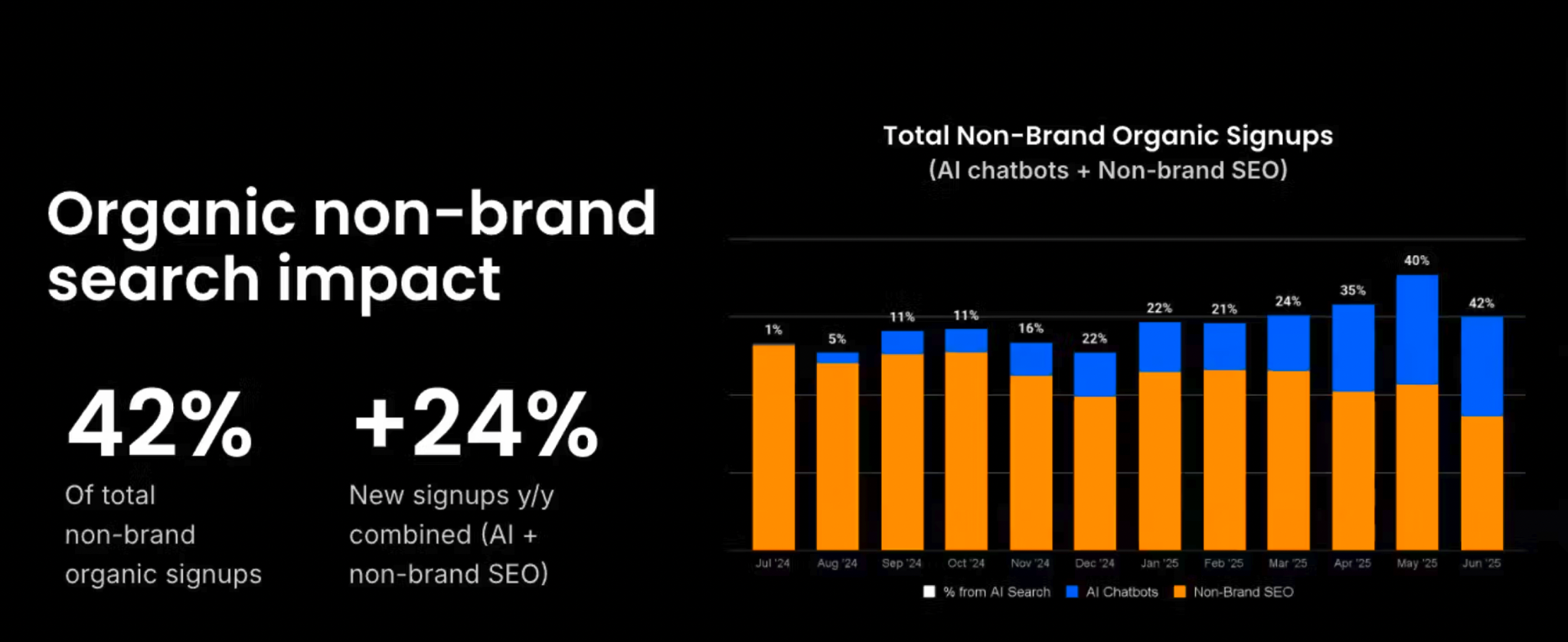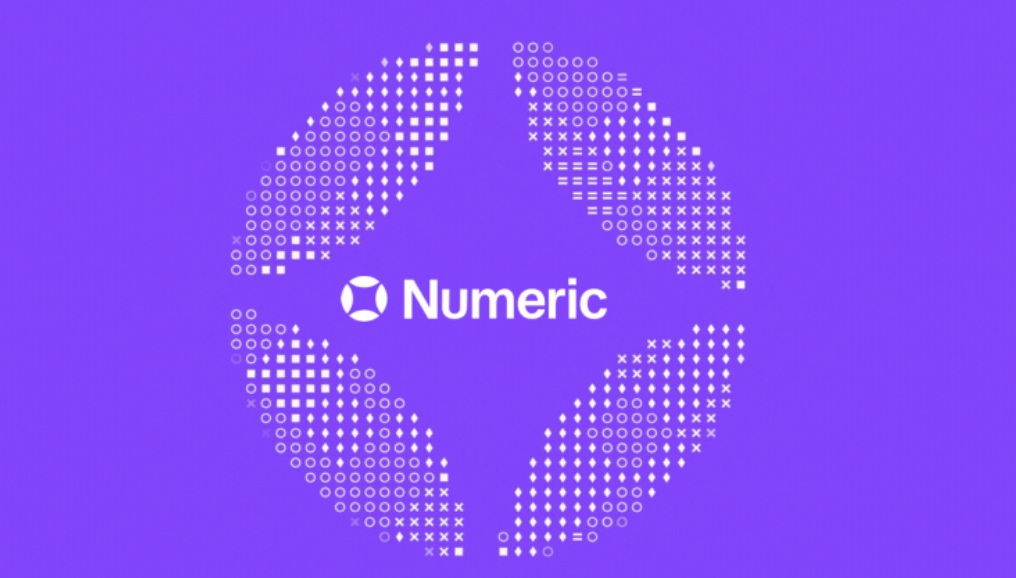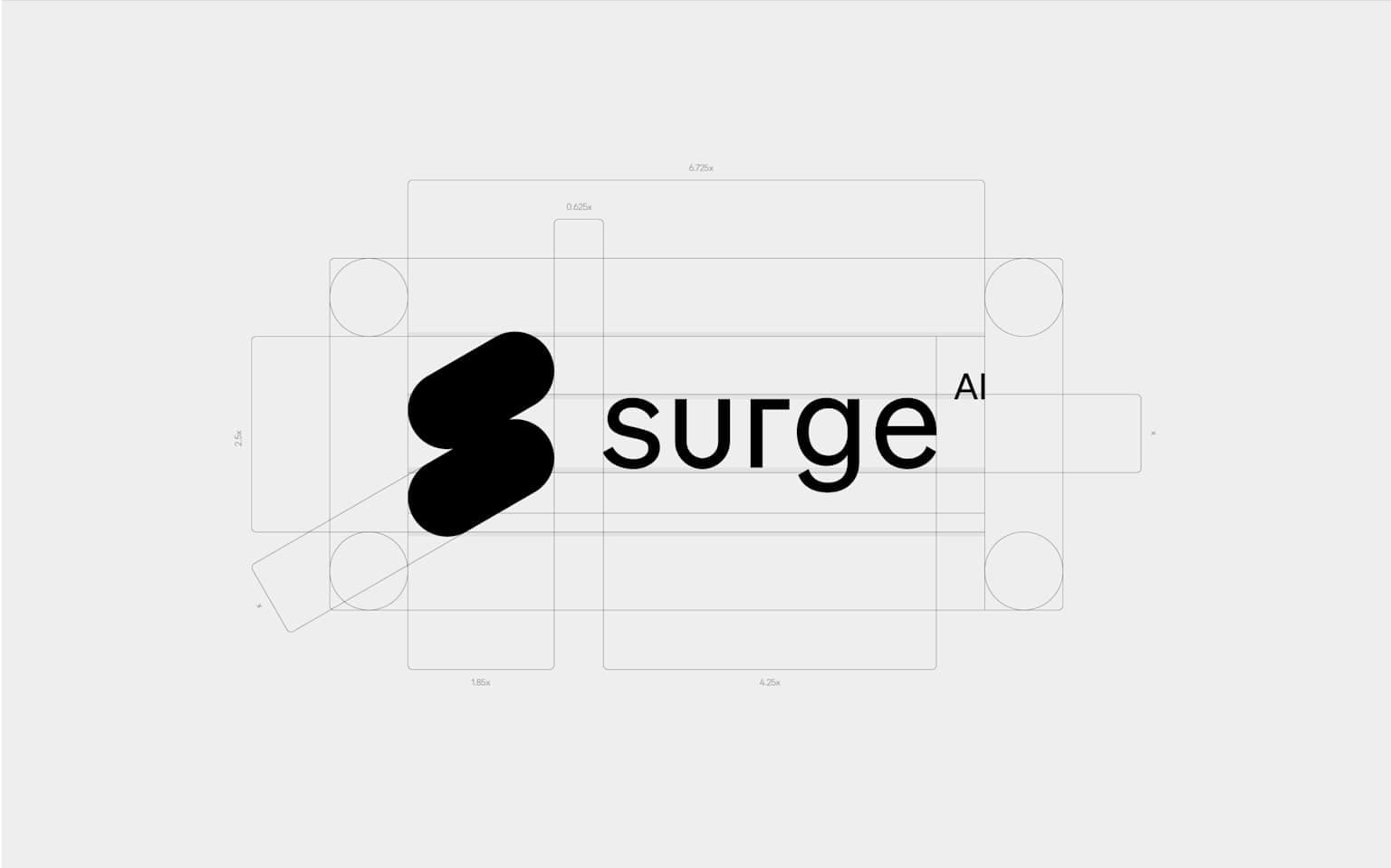TL;DR
- ChatGPT sends 36x less traffic than Google but converts 6-15x better
- B2B brands focusing on AI optimization are seeing revenue grow despite traffic drops
- The window to establish AI authority closes in 18-24 months
Webflow noticed something unusual in their analytics that changed how they think about traffic. AI chatbots now drive 42% of their non-brand organic signups, up from just 1% ten months ago. These AI-referred visitors represented a fraction of overall traffic but delivered a 24% year-over-year increase in total organic signups. [1]. These visitors were different. They had already spent 20 minutes in conversation with an AI, asking follow-up questions about integrations, use cases, and specific features before clicking through.
The old playbook said more traffic equals more revenue. The new reality? 100 ChatGPT visitors are worth more than 3,600 Google visitors.

The death of vanity metrics just got real.
Most B2B founders still chase traffic volume like it's 2019. They celebrate hitting 100,000 monthly visitors while their actual pipeline stays flat.
Meanwhile, companies optimizing for AI-driven discovery are seeing something different: AI traffic represents less than 1% of total sessions but converts at 9x the rate of organic search [2]. The reason lies in query complexity. Traditional search rewards brevity. AI search rewards specificity.

Google searchers type three to four words on average: "best project management software" [3]. ChatGPT users write 23-word questions with context: "what project management tool integrates with Salesforce and Slack for a 50-person marketing team that needs approval workflows" [4]. That specificity changes everything.
When someone clicks through from ChatGPT to your site, they've already self-qualified through multiple rounds of questioning. They know you solve their exact problem.
AI visitors arrive pre-sold. Google visitors arrive pre-skeptical.
The ChatGPT visitor just had a 10-minute conversation about their specific workflow, got a detailed explanation of how your product handles their edge case, and clicked through because the AI confirmed you're the only solution that does exactly what they need.
The Google visitor just compared 15 tabs of competitors, skimmed three affiliate listicles, and arrives exhausted from information overload.
Webflow sees this play out in their numbers daily. Early 2025, ChatGPT already drove 8% of their total signups but represents their most efficient channel by far [5]. Each ChatGPT visitor behaves like someone who's already been through three sales calls. They know your features, understand your positioning, and have specific questions about implementation rather than "what do you do?"
The behavioral difference goes deeper than intent. Search optimizes for comparison shopping. AI conversations optimize for specific answers to specific problems. When ChatGPT recommends your product for a particular use case, users treat it like a trusted advisor's recommendation, not just another search result.
The 18-month land grab nobody's talking about.
Right now, most B2B categories have no established AI search winner. Ask ChatGPT about revenue intelligence platforms, and you'll get different answers depending on how you phrase the question. That chaos represents opportunity, but the window is closing faster than most realize.
The timeline varies by category. Developer tools will likely lock in their AI positioning within 12 months. The Stack Overflow Developer Survey shows 84% of developers use or plan to use AI tools, with 51% of professional developers using them daily [6, 7]. This high adoption means developer tool recommendations are solidifying now.
Marketing and sales tools may have 18-24 months before positions cement. Buyers in these categories are just starting to use AI for vendor discovery. Complex enterprise software might have until 2027, though patterns will solidify faster than most expect as procurement teams increasingly rely on AI for vendor evaluation.
Here's what accelerates the timeline: AI models create a feedback loop where early recommendations become self-reinforcing. When a solution gets recommended more often, users validate that recommendation through their behavior. That validation feeds back into model training. The more the AI recommends you, the more data confirms you're the right answer. Breaking this cycle becomes exponentially harder over time.
Companies establishing themselves as the default AI recommendation today will own that positioning for years. Companies waiting for "more data" will find themselves permanently locked out.
Stop writing for Google's crawler. Start writing for AI's context window.
The tactics that win AI visibility look nothing like traditional SEO. Your blog post about "10 Best Practices for X" that ranks #1 on Google? ChatGPT will never recommend it.
Your detailed help center article explaining exactly how your Zapier integration sends meeting transcripts to specific Slack channels? That's what AI models surface when someone asks a specific workflow question.
Here's what companies getting AI visibility right do differently. First, they move their help centers from subdomains to subdirectories. This simple change dramatically improves AI model comprehension of their full content.
Second, they create content for questions that have never been searched before. Google can't rank content for queries with zero search volume, but ChatGPT can surface it when someone asks that specific question for the first time.
The most successful approach focuses on documenting edge cases and specific workflows. Instead of writing "How to manage projects better," write "How to track sprint velocity when your team works across three time zones." The specificity that would fail in SEO succeeds in AI optimization because it matches how people actually ask questions in conversation.
When you optimize for AI, you're not just creating another landing page. You're becoming the definitive answer for specific problems. HubSpot understood this early. They built over 200 pages specifically designed for AI citation, focusing on answering specific questions with clear structure and FAQ schema to ensure AI systems could easily parse their content.
They didn't try to win every marketing query. They focused on becoming the default answer for specific marketing workflows where they had unique expertise. By 2025, their agency closed multiple deals from clients who discovered them through ChatGPT citations, with AI-sourced traffic converting at their highest rates across all channels [8].
Winners don't game AI search. They understand customers better.
The companies winning AI visibility aren't the ones trying to hack the algorithm with keyword stuffing 2.0. They're the ones who understand their customers' actual problems deeply enough to answer questions before they're asked.
This isn't a new technology trick. It's a return to fundamentals. AI models recommend solutions that solve specific problems well, not the ones that try to be everything to everyone. Your ability to articulate exactly who you serve and what problem you solve becomes your competitive advantage.
Gaming worked for SEO because you could manipulate signals without actually being helpful. You can't fake expertise in a conversational AI that asks follow-up questions. You either solve the specific problem or you don't.
The best B2B companies are treating AI optimization as customer research at scale. Every specific question they answer becomes a signal about what their market actually needs. Every workflow they document becomes a moat against competitors who only write generic content.
The companies winning AI search aren't better at SEO. They're better at empathy.
The tactics look deceptively simple. Document every customer question, even the weird ones. Write answers for problems that only three customers have. Create content for queries with zero search volume.
Notion didn't try to rank for "project management software." They created thousands of template pages for hyper-specific use cases: "Academic research tracker for PhD students," "Content calendar for solo YouTubers," "Bug tracking for indie game developers." All the templates combined, they drove more qualified leads than their homepage.
The approach inverts traditional content strategy. Instead of one page targeting 10,000 searches for "CRM software," create 100 pages answering questions like "How to sync HubSpot deals with Notion databases using Zapier when deals close." The specificity that would fail in SEO succeeds in AI optimization because it matches how people actually ask questions in conversation.
But here's what most miss: this isn't about gaming a new algorithm. When you document every edge case, you're forced to understand your customers' actual workflows. When you answer questions nobody's asking yet, you discover problems your product should solve. The companies winning at AI optimization are using it as distributed customer research.
The paradox of AI optimization: the less you try to be everything to everyone, the more valuable you become to the right someone. While competitors chase vanity metrics, the winners are quietly documenting every edge case, knowing that tomorrow's buyer won't search for "best CRM software." They'll describe their exact problem to an AI, and the company with the most specific answer wins.
Frequently asked questions
Q: How do I measure AI-driven traffic if it doesn't show up in traditional analytics?
You can use a three-pronged approach. Implement post-conversion surveys asking "How did you hear about us?", track brand searches that spike after AI recommendations, and monitor when your company appears in AI responses using tools or manual testing.
Q: Should I completely abandon SEO to focus on AI optimization?
Not necessarily. SEO still drives organic traffic for B2B companies. Think of it as a portfolio approach. SEO gives you volume, AI optimization gives you quality. Companies seeing the best results dedicate a portion of their content efforts to AI-specific optimization while maintaining their core SEO strategy.
Q: How quickly will AI search actually replace traditional search for B2B?
It won't fully replace traditional search just yet, but it will capture the highest-intent searches first. By 2026, expect increasing amount of complex B2B research queries to start in AI chat interfaces rather than Google. The shift is even faster for technical audiences (developers, data teams). The key is that AI captures the moments that matter most, when buyers are making final decisions.
Q: What if my help center content is behind a login or paywall?
AI models can't access gated content, which means you're invisible for those queries. Make your help center publicly accessible but gate only sensitive information. Create public articles about features, integrations, and use cases while keeping account-specific or security information behind authentication. This gives you the best of both worlds: AI visibility and data protection.
Q: How do I know which specific long-tail questions to create content for?
Start with your sales call recordings, support tickets, or relevant Reddit threads. Every specific question a prospect or customer asks is a potential AI query. AI tools can help identify patterns. Ask it questions about your category and see where it lacks good answers. Those gaps are your content opportunities.
Q: Is it too late to start optimizing for AI if my competitors already appear in ChatGPT responses?
Not if you move fast and focus on specific use cases. Even if competitors own broad category queries, you can win specific workflow questions. The AI search landscape is still forming, and models update regularly. Focus on becoming the best answer for narrow, high-value queries rather than trying to own entire categories.
References
[1] Webflow Analytics Data. "AI Chatbot Impact on Organic Signups." Internal presentation slide, June 2025.
[2] Seer Interactive. "Case Study: 6 Learnings About How Traffic from ChatGPT Converts." 2025.
[3] Semrush. "29 Eye-Opening Google Search Statistics for 2025."
[4] Semrush. "New Study Reveals ChatGPT Search Trends: Insights from 80 Million Clickstream Records." 2025.
[5] Lenny Rachitsky. X post on AI search behavior. 2025.
[6] Stack Overflow. "2024 Developer Survey - AI Usage."
[7] Stack Overflow. "2025 Developer Survey - AI Usage."
[8] HubSpot. "How to Show Up in ChatGPT: HubSpot's Winning AEO Playbook." Inbound 2025 Session.



